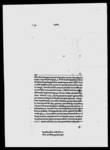An arjī from Lokaramaṇa Upādhyāya re the arrival of Prince Henry of the Netherlands in Calcutta (VS 1894)
ID: DNA_0001_0030
Edited and
translated by Manik Bajracharya, Simon Cubelic, Rajan Khatiwoda
Created: 2015-11-20;
Last modified: 2023-01-19
For the metadata of the document, click here
The accompanying edition, translation/synopsis and/or commentary are available under the terms of the Creative Commons Attribution-ShareAlike 4.0 International License
Abstract
In this report Lokaramaṇa Upādhyāya recounts the arrival of Prince Henry of the Netherlands in Calcutta, announces the dispatch of items requested by his addressee, identifies the current whereabouts of Governor General Lord Auckland and narrates the latest developments in the Anglo-Burmese relationship.Diplomatic edition
[1r]
1श्रीदुर्गाज्यू•1⟪नं३०⟫1अर्जि¯¯¯ ¯¯¯ ¯¯¯ ¯¯¯ ¯¯¯ ¯¯¯ ¯¯¯ ¯¯¯ ¯¯¯ ¯¯¯ ¯¯¯ ¯¯¯ ¯¯¯ ¯¯¯ ¯¯¯ ¯¯¯ ¯¯¯2उप्रान्तहलन्द्देजकावेलाइतकावादसाहकाजेठाछोरा•प्रेन्सिसआपअरंजउन्कोनाव़रहेछउमेर
3देषदामा२२तेइसवर्षकोउमेरमालुमहुन्छ६वर्षदेषिआफ्नावेलाइत्काफौजमालेफ्टेनभ
4य़ाकारह्याछन्•हिन्दुस्तानकोमुलुकहेर्नभनिआफ्नावेलाइतवाटकल्कत्तामार्गसिर्ष[...]दि३०रो
5ज३कादिन•आइपुगिसाँजकावष्तजहाजवाटउत्रिनव़ावगव़र्नरजनरलकाघर्मागय़ाजहाज
6वाटउत्रदाहुदिनव़ावगव़र्नरकाघर्देषिचानपालघाटसम्मगोराकोपल्टन्षडाथिय़ोजहाज
7वाटउत्रन्यावितिकैपल्टऩ्लेसलामिदिय़ोकिल्लावाट२१फैर्तोपकोसलामिभय़ोकल्कत्तैवाट
8फर्किजान्छन्किहिन्दुस्तानतिरपनिडुल्छन्केहिथाहाभय़ाकोछैन•वुझिपछिविन्तिचर्हाइ
9पठाउला•कार्तिकवदि११रोज३कादिनहिड्याकाहल्काराहरूआइपुग्याहुकुमआय़ावमौजि
10मकाअसवावकातलासमाछुमिलन्यावित्तिकैइनैहल्काराहस्तेगरिचर्हाइपठाउलाभविष्यपुराण
11लेषाएरपठाव़नुभनिहजूरवाटरजिडन्टमार्फत्जिमिसप्रेन्सिपसाहवकाहा•फर्माएसआय़ाको[...]
12हेछउन्कातलासमापनिथोरैठहरेछपुस्तकलेषाइरव़ानागर्नभनिमछेउपठाइदिय़ाकोछ•डा
13कमारव़ानागर्नषोज्दाहल्काराहरूआइपुग्यारथामिय़ाकोहोइनहल्काराहस्तेचर्हाइपठाउला•ञा
14हाँअंरेजहरूसितवुज्दानव़ावगव़र्नरजनरलवानारसकामोकाममाछन्वानारसवाटकुचगर्या
15कोषवरअरुआय़ाकोछैन•वर्माकामुलुकमाअंरेजसितसावीक्काअहदकरार्माकेहिविग्रला•भ
16न्याजस्तोसुनिन्छ२पल्टन्कालासिपाहिअचानकवाटसिलहटमामोकामगर्नभनिगय़ा२जं
17गिजहाजमनराजवाटआफ्नासिव़ानामालंगरगरिराषनुभनिरव़ानाभय़ा•ञाहापनि२जं
18गिजहाजवेलावषत्माकामचाहिएलाभनिकिल्लाकासामनेलंगरगरिराष्याकाछन्इतिसम्व
19त्१८९४सालमितिमार्गसीर्षवदि३रोज५मोकाम्कल्कत्तावडिवाजारदर्माहट्टासुभम्¯ ¯ ¯ ¯
20सेवकलोकरमणोपाध्याय़कोवेदोक्तःपु
21राणोक्तःसहश्रकोटिसुभासीर्वादसुभम्
Translation
[1r]
Glorious Durgā
No. 301
Uprānta: The name of the eldest son of the emperor of the foreign country (belāita)2 of Holland, it turns out, is Prince of Orange.3 By [his] looks, his age seems to be of twenty-two or twenty-three years.4 For six years he has been a lieutenant in his country’s army. He arrived from his own country (belāita) in Calcutta on Tuesday, the 30th of the dark fortnight of Mārgaśīrṣa, in order to visit the territory of Hindustan. He descended from the ship in the evening and went to the house of the navāba governor general. While he was descending from the ship, a white regiment was standing [lined up] from the house of the governor general5 to the Cā̃napāla Ghāṭa. As soon as he descended from the ship, the regiment gave a gun salute. From the fort came a salute of 21 bursts of cannon.6 It is not yet known whether he will return [home] from Calcutta itself or will also travel to Hindustan.7 I will inquire and let you know later.
The messengers who left on Tuesday, the 11th of the dark fortnight of Kārttika have arrived here. I am searching for the items you have ordered. As soon as I find them, I will send them through the hands of the same messengers. I see that you have conveyed orders through the resident (rajiḍanṭa)8 to James Prinsep to have written copies of the Bhaviṣyapurāṇa made and sent.9 What he found has proven to be very little. He has had a book copied and sent to me to send [to you]. I was about to send it by post but held back when the messengers arrived. I will send it through the hands of these messengers.
Upon inquiring with the English here [I heard that] the navāba governor general is currently residing in Benares.10 No other news has arrived that he has departed from Benares. It is heard that in the country of Burma the current treaty with the English may to a certain extent have been broken. 11 Two regiments of dark troops went off unexpectedly to be stationed at Sylhet. Two naval ships were sent from Madras (Manarāja)12 in order to anchor at their (i.e., the colonial government’s) own border. Here, too, two naval ships have been anchored in front of the fort for any contingency.
Thursday, the 3rd of the dark fortnight of Mārgaśīrṣa in the [Vikrama] era year 1894 (1837 CE). Residence: Baḍi Bājāra, Darmāhaṭṭā, Calcutta. Auspiciousness.
Thousands of crores of auspicious blessings from [your] servant Lokaramaṇopadhyāya as uttered in the Vedas and Purāṇas. Auspiciousness.
Commentary
This report belongs to a series of diplomatic briefings sent by Lokaramaṇa Upādhyāya while serving as the chief Nepalese envoy in Calcutta (see e.g. DNA_0002_0005, DNA_0002_0016, DNA_0002_0019, DNA_0002_0044, DNA_0004_0031, DNA_0004_0034). Similar to an earlier letter (DNA_0001_0032), Lokaramaṇa devoted much attention to diplomatic ceremonies, such as gun salutes. The departure of the governor general on a tour is the subject of an earlier report (DNA_0002_0005), while the further developments in Anglo-Burmese relations are taken up in a later letter (DNA_0001_0032). The documents show that the tasks of a vakila encompassed much more than providing political information. Vakilas transmitted cultural knowledge as well and were responsible for providing valuable foreign articles of interest to their masters.

